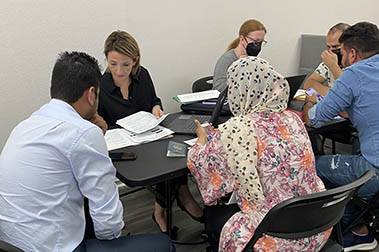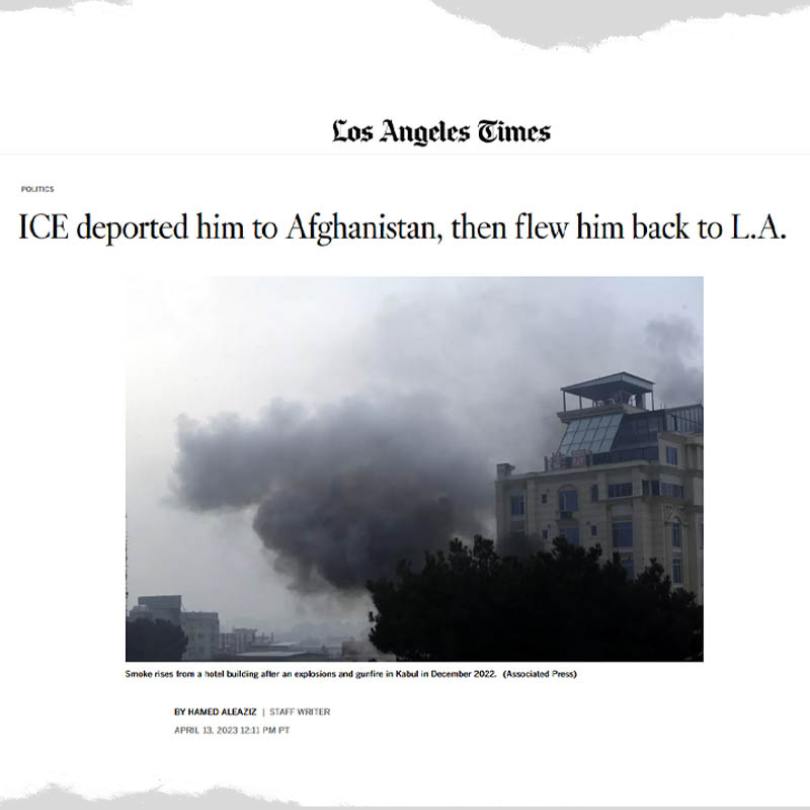Since the U.S. government evacuated people who were in danger from Afghanistan in 2021, communities across the country have welcomed new neighbors seeking to build a better life after being forced to flee their homeland.  Afghan adults, children, and families began arriving in Chicago soon after the evacuation, and with support from community partners and pro bono firms, the National Immigrant Justice Center (NIJC) began offering legal orientation and representation to hundreds of people eager to reunite with family members and secure permanent immigration status in the United States. In partnership with the Muslim Women Resource Center, who we’re honoring at NIJC’s Human Rights Awards on June 6, we reached our new community members with meaningful and culturally competent legal services. Afghan adults, children, and families began arriving in Chicago soon after the evacuation, and with support from community partners and pro bono firms, the National Immigrant Justice Center (NIJC) began offering legal orientation and representation to hundreds of people eager to reunite with family members and secure permanent immigration status in the United States. In partnership with the Muslim Women Resource Center, who we’re honoring at NIJC’s Human Rights Awards on June 6, we reached our new community members with meaningful and culturally competent legal services. Through this work, our team has witnessed first-hand how the U.S. government has failed in its commitment to support people whose lives were endangered as the U.S. military left Afghanistan and the Taliban retook power. Last Thursday, NIJC and pro bono partners at Kirkland & Ellis LLP filed a federal class action lawsuit on behalf of people from Afghanistan who have faced long waits for the Department of Homeland Security (DHS) to process their asylum applications. The plaintiffs in the case — people who worked for U.S. agencies in Kabul, women’s rights advocates, a healthcare worker, a teacher, and a journalist — came to the United States in August 2021 as part of the U.S. government’s Operation Allies Welcome, which allowed people who passed stringent security and background checks to receive two years of humanitarian parole while they applied for more permanent immigration status. DHS was supposed to process their asylum applications within 150 days. But as of this month, thousands of applications have been pending well past that deadline, and many people feel growing anxiety as their temporary parole status is set to expire in less than five months. Their safety remains in limbo, and their spouses and children trapped in Afghanistan continue to live under constant threats of danger. Meanwhile, people continue to flee Afghanistan to seek protection in the United States and many are caught up in the Biden administration’s unrelenting efforts to block access to the U.S. asylum system.  The Los Angeles Times recently reported on one young man NIJC represents, “Mr. A,” who traveled to the U.S.-Mexico border and requested asylum after escaping Afghanistan. The U.S. government locked him up for more than seven months in an isolated U.S. Immigration and Customs Enforcement (ICE) detention center in California, where he was unable to find legal counsel until after his asylum application was denied. NIJC began representing Mr. A just in time to help him appeal the asylum denial. The Los Angeles Times recently reported on one young man NIJC represents, “Mr. A,” who traveled to the U.S.-Mexico border and requested asylum after escaping Afghanistan. The U.S. government locked him up for more than seven months in an isolated U.S. Immigration and Customs Enforcement (ICE) detention center in California, where he was unable to find legal counsel until after his asylum application was denied. NIJC began representing Mr. A just in time to help him appeal the asylum denial. Then the unthinkable happened: The U.S. government unlawfully deported Mr. A back to Afghanistan while the appeal was pending in his case. For weeks, Mr. A hid from the Taliban while advocates worked with U.S. government officials to evacuate him from Afghanistan. Even though Mr. A had been wrongfully deported, when he returned to the United States DHS detained him again. Mr. A’s physical and mental health rapidly deteriorated. In addition to the post-traumatic stress he experienced from having to flee his homeland twice, he also suffered from chronic pain from injuries related to his asylum claim. Within hours of the LA Times story’s publication, ICE finally agreed to release Mr. A. We are relieved that he now will be able to pursue his asylum claim and begin to heal in the care of a welcoming community. The U.S. government has a long way to go to adequately protect Afghans and others seeking protection. NIJC continues to call on the Biden administration to pursue effective humanitarian solutions to receive and process newly arriving migrants seeking to rebuild their lives. Our Chicago community’s efforts to welcome people from Afghanistan and many other asylum seekers over the past two years shows that there is a better way to receive people in need of refuge.
You can support Afghans who are resettling in the U.S. and other people seeking asylum with a donation to NIJC: www.immigrantjustice.org/donate. |